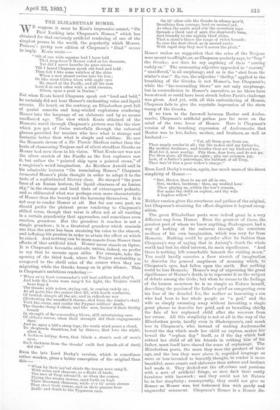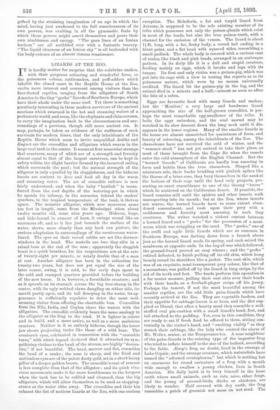THE ELIZABETHAN HOMER.
WE suppose it must be Keat's impressive sonnet, "On First Looking into Chapman's Homer," which has obtained for that curiously artificial rendering of one of the simplest poems in the world, the popularity which Messrs.
Putnam's pretty new edition of Chapman's "Iliad" seems to imply, Keats wrote :— "Oft of one wide expanse had I been told
Thst deep-brow'd Homer ruled as his demesne, Yet did I never breathe its pure serene Thst deep-brow'd Homer ruled as his demesne, Yet did I never breathe its pure serene Till I heard Chapman speak out loud and bold : Then felt I like some watcher of the skies When a new planet swims into his ken ;
Or like stout Cortez when with eagle eyes He stared at the Pacific, and all his men Look'd at each other with a wild surmise. Silent, upon a peak in Darien."
But when Keats heard Chapman speak out "load and bold," he certainly did not hear Homer's enchanting voice and liquid accents. He heard, on the contrary, an Elizabethan poet full of quaint conceits and long-winded euphuisms rendering Homer into the language of an elaborate and by no means unaffected age. The view which Keats obtained of the Homeric world through Chapman's picture was like the view
which you get of Swiss waterfalls through the coloured glasses provided for tourists who love what is strange and fantastic better than what is simple and sublime. He saw the Homeric dream of a Sir Piercie Shafton rather than the hosts of clamouring Trojans and of silent steadfast Greeks as Homer had seen them in his vision. What Keats saw was not the silver stretch of the Pacific as the first explorers saw it, but rather the "painted ship upon a painted ocean," of a magician's weird imagination. As Matthew Arnold said in his admirable lectures "On translating Homer," Chapman tormented Homer's plain thought in order to adapt it to the
taste of a sophisticated literary class. He steeped "the pure lines of an Ionian horizon, the liquid clearness of an Ionian sky," in the strange and lurid tints of extravagant pedants, and so obliterated what was perhaps even more characteristic of Homer than the beauty and the harmony themselves. It is not easy to render Homer at all. Bat for our own part, we should prefer the plainest prose rendering to Chapman's stilted verse, though that verse is often not at all wanting
in a certain grandiosity that approaches, and sometimes even reaches, grandeur. But the grandeur it reaches is not a
simple grandeur ; it is a theatrical grandeur which reminds one that the actor has been straining his voice to the utmost, and inflating his passion in order to attain the effect at which he aimed. And nothing can be more remote from Homer than effects of that artificial kind. Homer never stands on tiptoe. It is Chapman's favourite attitude, unless, indeed, we prefer to say that he mounts upon stilts. For example, take the opening of the third book, where the Trojan excitability is compared to the shrill cries of the cranes when they are migrating, while the Greeks tramp on in grim silence. This is Chapman's ambitious rendering :—
" When ev'ry least commander's will best soldiers had obey'd, And both the hosts were rang'd for fight, the Trojans would have fray'd
The Greeks with noises, crying out, in coming rudely on ; At all parts like the cranes that fill, with harsh confusion, • Of brutish clan& all the air, and in ridiculous war (Eschewing the unsuffer'd storms, shot from the winter's star) Visit the ocean, and confer the Pygmei soldiers' death. The Greeks charg'd silent, and like men, bestow'd their thrifty breath In strength of far-resounding blows, still entertaining care Of either's rescue, when their strength did their engagements dare.
And as, upon a hill's steep tops, the south wind pours a cloud, To shepherds thankless, but by thieves, that love the night, allow d, A darkness letting down, that blinds a stone's east off men's eyes ; Such darkness from the Greeks' swift foot (made all of dust) did rise."
ven the late Lord Derby's version, which is sometimes rather wooden, gives a better conception of the original than this :— "When by their sev'ral chiefs the troops were rang'd, With noise and clamour, as a flight of birds, The men of Troy advanc'd; as when the cranes, Flying the wintry storms, send forth on high Their dissonant clamours, while o'er th' ocean stream They steer their course, and on their pinions boar Battle and death to the Pygnirean race. On th' other side the Greeks in silence mov'd, Breathing firm courage, bent on mutual aid, As when the south wind o'er the mountain tops Spreads a thick veil of mist, the shepherd's bane, And friendly to the nightly thief alone, That a stone's throw the range of vision bounds ; So rose the dust-cloud, as in serried ranks With rapid step they mov'd across the plain."
Homer makes no suggestion that the cries of the Trojan were meant to affright, or, as Chapman quaintly says, to "fray" the Greeks ; nor does he say anything of their "coming rudely on." The unmeaning adjective appended to "storms," " unsuffered," is all surplusage, and so is the "shot from the winter's star." So, too, the adjective "thrifty," applied to the breathing of the Greeks, is not Homer's, but Chapman's; while the "far-resounding blows" are not only surplusage, but in contradiction to Homer's narrative, as no blows have been struck or could have been struck before Paris's challenge was given. And yet, with all this embroidering of Homer, Chapman fails to give the requisite impression of the stern tramp of the Greeks.
If we turn to the farewell between Hector and Andro- mache, Chapman's artificial pathos jars far more on the mind of the true lover of Homer. Here is Chapman', version of the touching expression of Andromache that Hector was to her, father, mother, and brothers, as well as husband :—
" Yet, all these gone from me, Thou amply render'st all ; thy life makes still my father be, My mother, brothers ; and besides thou art my husband too, Most lov d, most worthy. Pity then, dear love, and do not go, For thou gone, all these go again ; pity our common joy, Lest, of a father's patronage, the bulwark of all Troy, Thou leav'st him a poor widow's charge."
Even Lord Derby's version, again, has much more of the direct simplicity of Homer :-
"But, Hector, thou to me art all in one, Sire, mother, brethren! thou, my wedded love! Then pitying us, within the tow'r remain, Nor make thy child an orphan, and thy wife A hapless widow."
Neither version gives the sweetness and pathos of the original, but Chapman's straining for effect disguises it beyond recog-
nition.
The great Elizabethan poets were indeed great in a very
different way from Homer. Even the greatest of these, the greatest poet of whom we know anything, Shakespeare, had a way of looking at the universe through the conscious medium of his own imagination, which was very far from Homeric. Nothing could be grander after its fashion than Cleopatra's way of saying that in Antony's death the whole world had lost its chief interest, its main significance. "And there is nothing left remarkable beneath the visiting moon." You could hardly conceive a finer stretch of imagination to describe the general emptiness of meaning which, to Cleopatra's eyes, had fallen upon the earth. But nothing could be less Homeric. Homer's way of expressing the great significance of Hector's death, is to represent it as the subject of debate among the Gods ; but when he comes to the feelings of the human mourners he is as simple as Nature herself, describing the passion of the father's grief as conquering even his fear of the dreaded foe, the mother as lamenting a son who had been to her whole people as "a god," and the wife as simply swooning away without inventing a single great phrase to describe her grief, and as bewailing chiefly the fate of her orphaned child after she recovers from her swoon. All this simplicity is not at all in the way of the Elizabethan poets, hardly even in Shakespeare's, and much less in Chapman's, who, instead of making Andromache bewail the day which made her child an orphan, makes her bewail the "orphan day" itself, as if the day which had robbed her child of all his friends in robbing him of his father, must itself have shared the sense of orphanage. The Elizabethan poets, the more they were the product of their age, and the less they were above it, regarded language as more or less invented to beautify thought, to render it more beautiful, more ornate and elaborate than nature and instinct had made it. They decked-out the affections and passions with a sort of artificial fringe, as men deck their costly furniture with laeowork ; and they could not let Nature be in her simplicity ; consequently, they could not give us Homer as Homer was, but festooned him with gaudy and, ungraceful ornament, Chapman's Homer is a Homer die-
gutsed by the straining imagination of an age in which the mind, having just awakened to the full consciousness of its own powers, was exulting in all the gymnastic feats by which • those powers might assert themselves and prove their own nimbleness and energy. "The pure lines of an Ionian horizon" are all scribbled over with a fantastic tracery. "The liquid clearness of an Ionian sky" is all beclouded with the body-colours of an almost riotous renaissance.







































 Previous page
Previous page